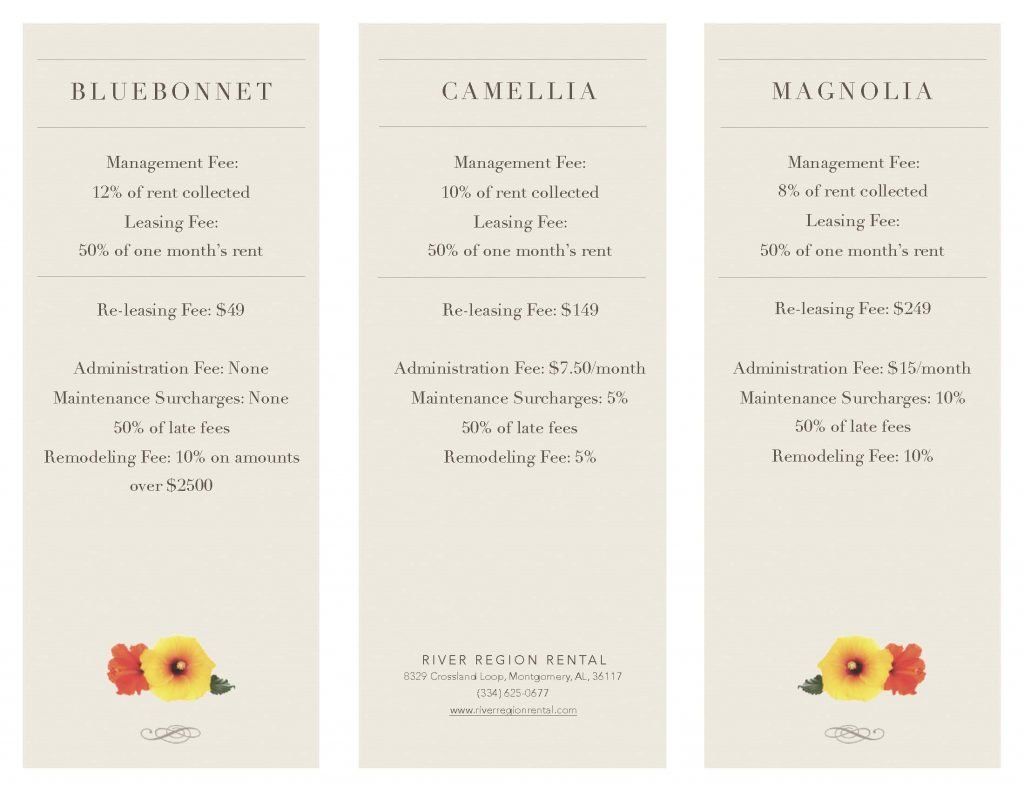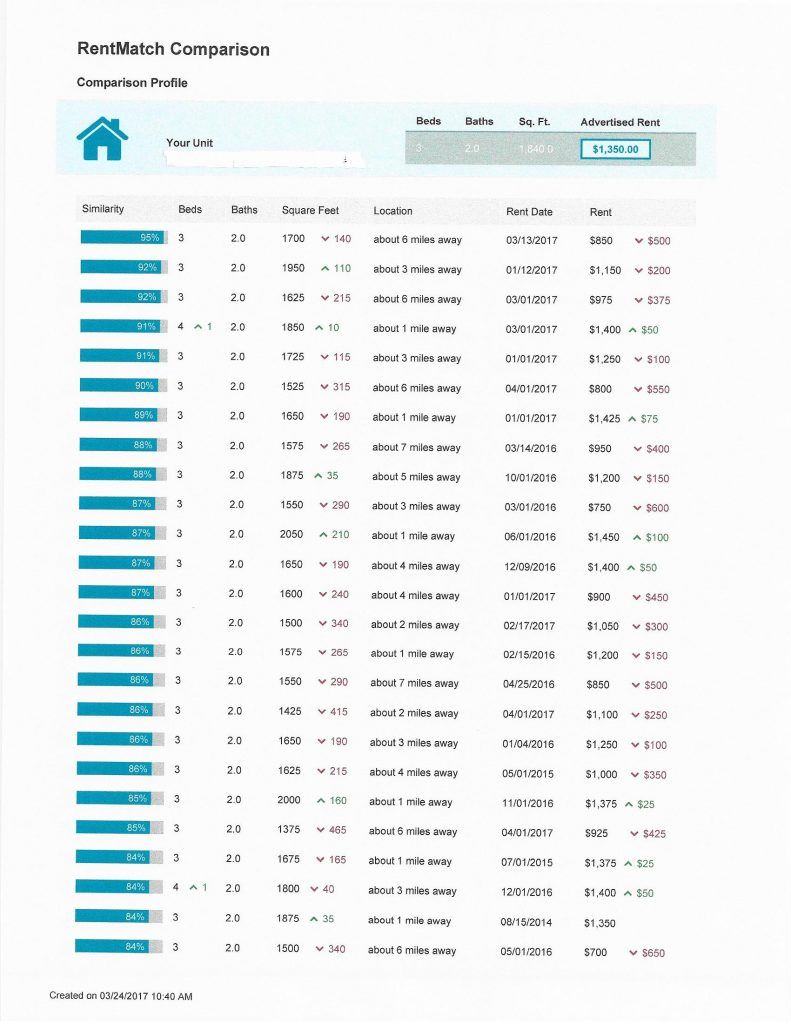JOURNAL

For those interested in our single-family fee schedule, here are our plans. We offer 3 different fee schedules for single-family rentals depending on your current desires for income management and your properties’ anticipated maintenance forecast. We named them after the state flowers of Texas, Alabama, and South Carolina. The Bluebonnet fee schedule streamlines your rental income to help plan what your monthly property management fee impact will be. Magnolia offers a break on the ongoing management fee at the risk of paying more in maintenance surcharges. If you have a very-well maintained home and expect to have low maintenance costs, the Magnolia fee schedule could save you money. Camellia offers a mix of the advantages of both Bluebonnet and Magnolia. Single-unit properties, duplexes, and triplexes can be managed on these plans. For four-plexes we typically offer the property owner a choice between using the fee schedules below, or transitioning to our commercial plans for higher unit properties. Attached is a file where you can download the fee schedule and explanation of fees. Any questions please call us (334) 625-0677. We’d love to help you rent your home!
Laser focused As far as we can tell; River Region Rentals is the only property management firm in the area that exclusively does property management and does not engage in real estate sales. We feel this is a distinct advantage because our focus isn’t diluted between selling property for maximum gain; or preserving and enhancing property value while building a revenue stream. These typically are two separate goals. They are not incompatible, but the best skill set for selling homes may not be the same skill set needed to deal with storm damage on a Saturday. Oh by the way, a tree fell on the fence and Rover is now roving the neighborhood. Welcome to property management. No back-up plan We are a husband-wife team. We are all-in; we have a decided interest in keeping our clients happy as this business is our sole income. When you come to us you aren’t dealing with a huge company with franchises, multiple locations, dozens of real estate agents in a cube farm, or 9-5 employees who forget about you on the drive home. The owners of this company ARE the company- we are actively involved at every level because we do every job, from the trivial to the most important. If we don’t get it done, we don’t get paid. Our philosophy River Region Rentals may not be the best, but we strive to be the best. Our attitude is one of continual improvement; and this job brings lessons every day. We make mistakes sometimes, and we try to learn from them. Our daily life We love our tenants. Most of them. Some tenants we endure. Some tenants we ask to move away, and a tiny percentage we have to evict. Some we see rarely, some we see often, all of them know us. We love our home owners. Many of them are personal friends. Some home owners we endure. The ones we don’t we love and don’t care to endure, we discuss in kind words before we fire get rid of them. THAT is one pro to business ownership we both appreciate. Our Perspective On a personal level, we’ve rented homes for ourselves to live in, and we’ve also bought, sold, and currently own rental homes. Having been on all the different sides, we sympathize with tenants, we know what the market offers for sales, and we recognize the challenges of home ownership. We bring an empathy to home renting we suspect is valuable. Some of our investors are high net-worth individuals that don’t blink an eye at expensive repairs, while most of the rest of us (!) are counting on rent to pay a mortgage. We get it, and as River Region Rentals we try to tailor our management to your needs and goals.
1. Does your firm also do real estate sales? If the answer is ‘yes’ consider that handling real estate transactions is vastly different than managing tenants and maintaining property. Often, real estate companies ‘do management’ just to hold on to a client if they can’t sell the house. It’s a way of keeping that home owner in an orbital holding pattern till the house can sell, or at least get revenue to cover the lost revenue. It’s not that real estate agents can’t property manage, just recognize it may not be their primary focus. (Here at our company we absolutely don’t do real estate sales because the skill set is different. There are lots of great people who show and sell houses, and we don’t want to compete with them. Instead, we are accomplished at finding great tenants and collecting rent.) 2. How long have you been at the property management gig? Specifically, how long have you done this job? Nothing against newbies, but it takes a pro to run across most of the scams and develop a good stable of maintenance staff. Look for a property manager with 10 years of focused, unbroken, property management experience or more. 3. Show me the resume and a lease. Your property manager should be able to send you a resume on request, as well as sample leases and management agreements. Also ask for a list of fees. 4. How do you handle accounting? Go through how they handle escrow accounts, how they do statements, etc. If they are tracking stuff in Excel, Quicken, or with pen-and-paper run away!! Just a while back we had a real estate agent brag to us how he managed forty houses with a notebook. We just smiled and groaned on the inside. What a disaster. In this day and age a professional will have invested in a quality whole-office software infrastructure. Packages used by the pro’s would be Buildium, Appfolio, Sitelink, etc. (We use Appfolio, but also evaluated Buildium at length and both are highly professional and polished whole-office solutions.) 5. How large is your portfolio? Expect no precise answers, because you won’t receive any. But you would expect an established firm in this market to have several hundred units consisting of 10+million in value, and they should be able to give you a ballpark of at least this size. 6. How do you handle payments? A property management firm is going to have lots of ways to collect rent. An office with fixed hours, a way to take payments digitally online, and an after-hours drop box are bare minimum. If they take credit cards over the phone this is a nice bonus but many people are moving away from this nowadays. (River Region Rentals quit taking verbal cc’s in 2016, and only take them via our secured online tenant and owner portals). 7. How do you handle maintenance calls? Be looking for a 24 hour line, an online portal, and a dedicated office person who coordinates maintenance activities on behalf of the firm. Some of the larger companies even have in-house maintenance staff who actively go on calls, which can be nice. For now, we choose to use 3rd parties for maintenance as we don’t want to have a ‘profit motive’ to perform repairs. We want to do repairs because it’s required in order to maintain the asset you’ve entrusted to us. For the same reason, we don’t charge maintenance fees. However, some companies have in-house maintenance staff to reduce costs and those savings may be passed on to you as a property owner. 8. How often do you pay contractors and owners? This can be a complicated question to answer. Here at River Region Rentals we pay contractors and vendors weekly on Thursdays, and pay owners on the 2nd week of the month after rents have been collected. This means, due to the random nature in how things break, we often pay bills on behalf of the property owner AFTER the property owner has been paid. For obvious reasons, many property managers prefer not to do this. We can handle billing in this way due to the large size of our portfolio and the way we handle escrow accounts. We choose to do this for two reasons: ONE, our property owners are very vocal in that they want the money due to them rapidly, and TWO, in order to maintain strong contractor/vendor relationships we pay quickly and don’t make them wait net 30 (or longer). However, many professional firms follow a rigorous 4-step cycle during the month, and it’s a very clean way to do things. I’ll describe it here. (There is nothing wrong if your property manager follows the course below, it’s just that you will wait longer for your rent to be paid). Rent week/Week One: Fill the piggy bank (take in rent payments) Week Two: Empty the piggy bank (pay contractors, vendors, etc on behalf of property owners. Also take management fees.) Week Three: continue to empty the piggy bank (pay owners) Week Four: Send monthly statements reflecting weeks one through three. 9. Does the property manager answer the phone? Strangely enough, this is one of the most common compliments we get. If you call during office hours, expect to get an answer from a live person. If you don’t get an answer as a property owner, what do you think about the contractor asking for permission to fix the broken pipe or the tenant wanting to rent a vacancy they found? 10. Will your property manager tell you about the market? Call up a potential property manager and ask them about potential rents, school districts, houses they manage in the area or on that street, places to consider buying a second or tenth rental, etc. They should be willing to spend some quality time with you, giving you good information with no obligation. A good property manager thinks of every call and interaction as a referral and will do their best to be helpful and give a good impression. You will be able to get a good feel for the office right away just by calling them and chatting for a while. 11. Tell me about your web presence. At minimum, they should have a web presence, easily found by search engines, that 1) advertises their vacancies and 2) gives owners a way to access statements and 3) tenants a way to track maintenance calls and pay rent.

What follows is an attempt at an honest comparison between self-managing rental property vs hiring a property manager to do it for you. Of course, I’m a bit biased being in the business as a ‘professional’ but I’ve also self-managed rental homes in the past. I currently own an LLC with a small portfolio of homes managed by River Region Rental, so in a sense I still do ‘self-manage’ but from behind the firm. What I would like to do is break down the various elements of the job and compare and contrast how each side approaches the task. Hopefully I can create a list of pro’s and con’s to let property owners properly evaluate how to approach managing a rental.



